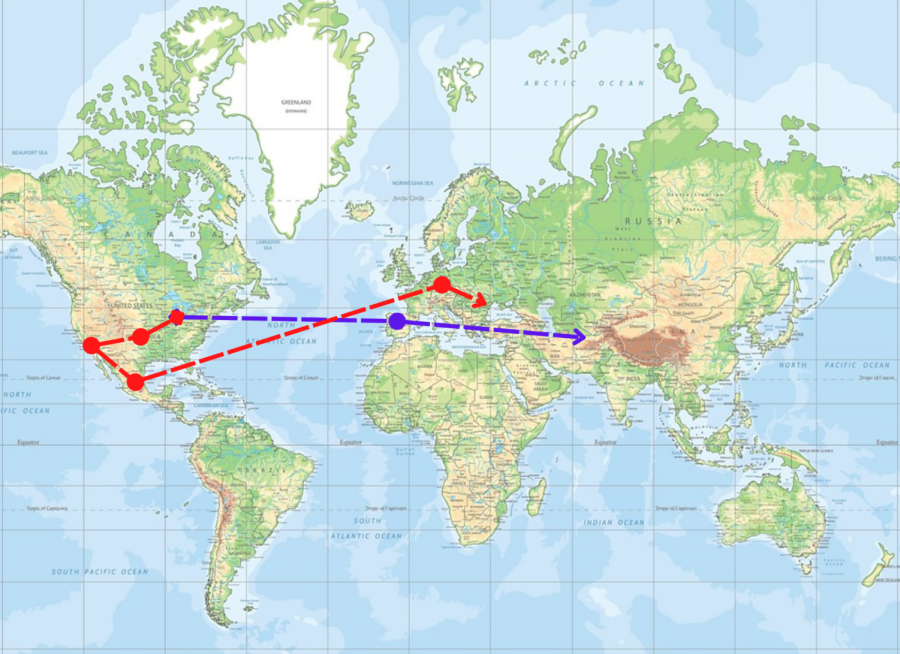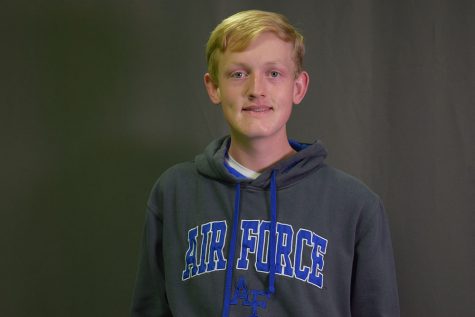Far from home: The path from war-torn countries to Indiana is often a dangerous one
The journeys of Bashir Khari and Vitalii Arnaut took them more than halfway across the world. Khari’s path (in purple) brought him to Indiana from Afghanistan. Arnaut’s journey (in red) brought him from Ukraine to the Midwest via California.
February 1, 2023
As of November 15th, 2022, there are now over 8 billion people on Earth. Each and every person has a unique and interesting story like no other. Some people are born and live their lives in the same town that their ancestors came from. Some are trailblazers, forging their own path in the world, whether by choice or by circumstances outside of their control. One thing is for certain — their story deserves to be told.
Sophomore Bashir Khari is a new face this year in the halls of NHS. Khari has been on quite the journey the past few years and has had life experiences many will not ever experience.
“I was born in Sheberghan, Afghanistan, near the border of Turkmenistan.” Khari said, “I lived there for about a decade, however I cannot remember exactly how long.”
When Khari lived in Sheberghan, he played soccer with the other kids and lived what he knew as normal in his life. However, geopolitical and violent circumstances forced him to leave his birthplace and embark on a journey across the world that would take him far from home.
“When I was 9 years old, my father was killed [by the Taliban] for collaborating with the U.S. Army. I was with my mother and brother at the age of 14 when the Taliban attacked. At that time, America was withdrawing its army from Afghanistan along with the Afghans who were working with them. My father also worked with them, but after my father was killed, my cousin joined the U.S. Army instead of my father.” Khari said. “My uncle tried hard to get Americans to let us come with them. He finally managed to get us on a military plane. There were so many people, we all sat on the floor so that there was enough room for more.”
During the United States’s evacuation of Afghanistan in September of 2021, many others were in the same situation as Khari. Some were lucky and were able to get out like himself, but others were not so lucky.
“We first entered Spain, it was very good and we stayed there for two weeks until our documents were prepared. We wanted to go with my cousins, but my cousins’ papers had a little problem, so we got separated from them.” Khari said. Next, Khari described his journey into the United States and its struggles, but also his excitement to leave Afghanistan.
“We arrived in America two days before my cousin. I was very scared because my cousin wasn’t there. We had gotten separated from them, but somehow made it to Chicago. We were placed in a military camp, so they could find us a place to live and a company to help us. We were happy to get out of Afghanistan and happy that my cousin was coming, but they were taken to a military camp in New York. We were there for three months. After about three months, Exodus, an immigration refugee company, took over our work and provided a lot of help such as food and building rent.”
In a world so embroiled with turmoil, situations similar to Khari’s are occurring around the world each and every day. Some will never return to the place from which they left, others will make the journey back, once they feel the time is right. For Khari, his chance to return is a matter of patience, waiting for something that the region has been hard pressed for as of the last few decades.
“I am happy here in America, it is nice and it is safe.” Khari said, “But I want to go back to Afghanistan. Once there is peace.”
Junior Vitaliy Arnaut has another earth-shattering story to tell. He started at NHS around four weeks ago, but has undoubtedly stood out.
Arnaut lived in Odessa, Ukraine just 10 months ago. Odessa is a coastal city on the Black Sea in western Ukraine, just about 34 miles from Moldova. In late February, the Russian invasion of Ukraine forced Arnaut and his family to leave the country.
“[We left] the second day of [the] war, people [were] panicking. People were running because they didn’t expect [this] to happen, our world was shocked.” Arnaut said.
Odessa is one of Ukraine’s largest coastal cities, meaning it was a predominant target for the Russian navy. Shellings and bombings were common near Arnaut’s home as he and his family frequently heard sirens and took cover on the first level of their home.
“[Ukraine] was dangerous,” Arnaut said.
He and his family were left with no other choice, than to get out. His family leaving with him included his mother, older brother and younger sister.
“We walked from Ukraine to Romania, [because] there were too many people.” Arnaut said.
After Romania, they were able to make it into Germany. Once they arrived in Germany, they got on a flight to Mexico, with hopes of being granted entry into the United States to meet up with family living here. Eventually, the family made it to San Diego, California.
“When I first came to San Diego it was 3AM, my family and I had no idea where we were [going].” Arnaut said, “People [other Ukrainians] came to my family and I, and [offered] us a place to stay… They had a church for people from Ukraine who crossed the border. They had a bus, [it took us] from San Diego to Sacramento [and then] to my cousin’s house.”
The family had finally made it somewhere safe and after a month of struggle, was able to relax. This brief instance of stability wasn’t going to last long, as they still needed work and a permanent home in the U.S. However, Arnaut was no stranger to heartbreak and shock.
“My father passed away 10 years ago, he drowned,” Arnaut said.
While on vacation in the Black Sea, his father died suddenly. 10 years later, when the invasion forced his family to leave Ukraine, Arnaut would make the journey without his father by his side. After the family had been living in Sacramento for a while, they decided it was time to relocate.
“We flew from California to Missouri [to meet with different cousins].” Arnaut said, “After two and a half weeks… we [drove] to Topeka, [and lived there] for six months.”
The family’s time spent in Topeka, Oklahoma would be the first time that the four of them would live on their own after leaving Odessa. Arnaut’s mother didn’t work in Topeka, instead, it was his older brother who joined the workforce. Arnaut’s brother worked in lawn care while the family lived in Oklahoma. Lawn care became the only source of income for Arnaut and his family. After six long months, Arnaut’s mother was offered a job in Indianapolis.
Today, the Arnaut family is able to comfortably live in Noblesville with some close friends of theirs. After 9 months of struggle and heartache, they were able to find peace and stability here in Noblesville.
Arnaut and Khari have seen it all, and each of them have lived through unimaginable events that most of us couldn’t even begin to fathom, but they’re here now, right here at NHS ,where they belong.




